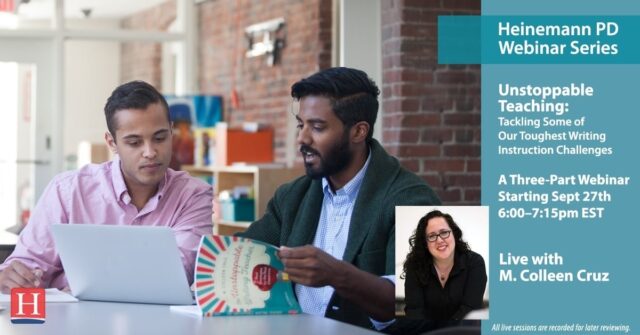
With classroom-tested tips from our Curricular Resources authors on how to improve your teaching at any grade level, each Writing Masters installment will share author insights and practical suggestions on teaching writing in the classroom that you can use the very next day. This week in the Writing Master series, Carl Anderson describes the conversational moves he uses in student conferences.
"When I’m conferring with a student, I love hearing what she has to say about her writing. What she tells me, then, helps me realize the promise of the conference—that I can tailor my teaching to her individual needs as a writer, wherever she is in the process of writing." —Carl Anderson
Conferring with Students Across the Writing Process
by Carl Anderson
One of the questions that teachers ask me about conferring is how I know what to teach students in each of the different stages of the writing process. My answer is a simple one: ask students about what they’re doing as writers.
In my book, How’s It Going? A Practical Guide to Conferring with Student Writers, I make the point that a writing conference is a conversation between a teacher and student. The word conversation, of course, suggests that not only the teacher, but the student also makes an important oral contribution to a conference.
What she tells me helps me realize the promise of the conference
When I’m conferring with a student, I love hearing what she has to say about her writing. What she tells me—where she is in the writing process, what she’s trying to do as a writer, what she’s trying out that has been taught in mini-lessons, the problems she is wrestling with—gives me information that I need to make a good, accurate decision about what to teach her in the conference. What she tells me, then, helps me realize the promise of the conference—that I can tailor my teaching to her individual needs as a writer, wherever she is in the process of writing.
Since writing conferences are a type of academic conversation, many students haven’t learned how to have them outside of school. Thus they need us to help them learn how to play an active role in conferences. When I’m conferring with students, here are some of the conversational moves that I use to support their talk:
- I begin each conference with an open-ended question that invites a student to say a lot about her writing. While the question, “How’s it going?” is a favorite way of starting a conference, I sometimes begin with, “What are you doing as a writer today?” Starting with one of these questions immediately puts responsibility on the student to say something.
- After I ask my initial question, I look expectantly at the student, not saying anything, sometimes for as long as 20–30 seconds. It can take a while for a student to step outside of her writing and be able to articulate what is going on with it, so it’s crucial that I give her that time. And being quiet is another way that I put responsibility on the student for talking about what she’s doing as a writer.
- I listen actively to what a student says about her writing. One important active listening skill is to respond to what a student says by repeating what she said, and then nudging her to elaborate further by saying, “Tell me more about that.” When I make this simple conversation move, a student who initially says, “I’m revising by adding details to my writing,” might explain that she’s trying to add character actions and thoughts to her dialogue, information much more precise and helpful to me as I try to decide what to teach her about revising a draft.
- In response to what a student says, I ask questions to elicit even more information from her. Most of the questions that I ask come from my knowledge of what writers do at particular stages of the writing process. For example, when a student tells me she is starting her draft, I’ll ask, “What is your plan for the draft?” or if she tells me that she’s revising her draft, I’ll ask, “What kind of revisions do you think your draft needs, and why?”
You can watch me demonstrate these conversational moves, and support student talk, on the DVD, “Carl on Camera,” part of my Heinemann curricular resource, Strategic Writing Conferences. I would suggest starting with Conference 5 in the “Topics” menu, “Finding a Topic by Mining a Writing Territory;” Conference 24 in the “Drafts” menu, “Crafting a Scene by Describing Character Actions,” and Conference 3 in the “Finished Projects” menu, “Revising by Focusing an ‘All-About’ Story.” In these conferences, the students talk fluently and precisely about what they’re doing as writers, with some support from me. This helps me make just the right teaching decisions to meet their needs. Click here for samples from the resource.
♦ ♦ ♦ ♦
 Carl Anderson is the author of How’s It Going? A Practical Guide to Conferring with Student Writers, a classic book on conferring, as well as Assessing Writers and Strategic Writing Conferences. A former elementary and middle school teacher, Carl gives professional development workshops and coaches teachers in schools all over the world.
Carl Anderson is the author of How’s It Going? A Practical Guide to Conferring with Student Writers, a classic book on conferring, as well as Assessing Writers and Strategic Writing Conferences. A former elementary and middle school teacher, Carl gives professional development workshops and coaches teachers in schools all over the world.
♦ ♦ ♦ ♦
Next week, Laura Robb returns to our series with tips on how to focus and prepare your conferencing.
Click here to see the full Writing Masters Blog Series lineup, and, using the form below, sign up for email alerts when each new blog is posted.


